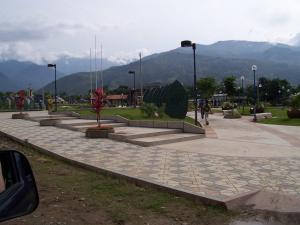Consequences of Prohibition
Drug War Issues
Politics & Advocacy

coca leaf statures, Rio Apurimac Valley (stopthedrugwar.org)
The survey estimated Peruvian coca planting at 157,000 acres, with government-led eradication efforts destroying only about 25,000 acres, down 14% from the previous year. The UNODC estimated total coca leaf output of 131,3000 tons, up 4.3% over 2010.
Half of the Peruvian crop is planted in the Apurimac, Ene, and Mantaro valley region in the southeast, but the biggest increase in cultivation came in the northern states of Bajo Amazonas, Maranon, and Putumayo, with a regional increase of 40.4%. Production in those states is on the increase to meet the demand for cocaine and crack cocaine in Europe and Brazil, which is the second leading consumer country after the United States.
"Drug traffickers are becoming more efficient," said Flavio Mirella, the head of the agency's Peruvian office, at a Lima press conference. "Traffickers need less coca leaf to produce more cocaine. Routes of supply are diversifying and producing areas are getting closer to certain routes of exit" toward Brazil and through Bolivia to Brazil and beyond.
Guerrillas of the leftist Shining Path have also been involved in the coca and cocaine trade, and have stepped up attacks on Peruvian police and military this year. President Ollanta Humala has vowed to increase both eradication and the presence of the state in remote, guerrilla-infested coca production areas.
This work by StoptheDrugWar.org is licensed under Creative Commons Attribution-ShareAlike 4.0 International
Add new comment